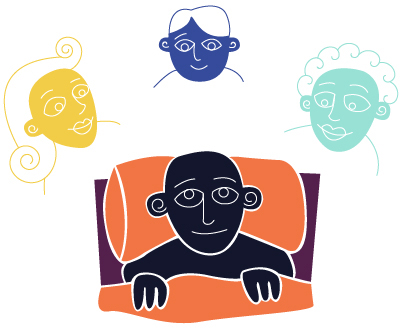The Story of a Feather

A white feather floated out of my old parka into the hospital room. The timing was uncanny. I work as the storyteller-in-residence at Baycrest Health Sciences, and was visiting a patient in the palliative care unit. Milton was very frail, and his wife and daughter were keeping vigil at his bedside. Even in our short acquaintance, I knew him to be a gentle, courtly, funny man. The day he was admitted, he was surrounded by the women he loved and who loved him: wife, daughters, daughters-in-law, granddaughters. “I won the lottery,” he said, gesturing at his circle of beloveds. He was a good man who’d had a good life. Despite the sorrow in the room, I asked his wife and daughter if Milton had a favorite joke. Turns out he did, so I asked them to tell it to me.
Storycare – making room for stories to be told, heard, and remembered – should be an essential part of healthcare. One woman I met on the 6th floor was in her early sixties. She needed a story she could tell her grandchildren to help them understand the mystery of her imminent death. I told her the West African story of the tortoises, the human beings, and the stones.
In the beginning of the world, there was no death. Every living creature could live forever, on one condition: they couldn’t have children. One day tortoises came to Worldmaker and asked to have baby tortoises. They said, “If we can look on the faces of our children first, then we are not afraid to die.” They rejoiced as their children began to be born. And then everyone wanted children, including Man and Woman. “Are you willing to die,” asked the Creator, “so that you may have children?”. All living creatures agreed. And that’s how death came into the world.
My listener asked, “What about the stones? You said it was a story about tortoises, people, and stones.” I told her that, according to the story, stones never wanted to have children. That’s why stones never die. She found the story strangely comforting. “It’s better to be a grandma than a stone,” she said, “even if you don’t last forever. That’s what I’ll tell them.”
Sometimes I tell the old proverb: A person is not dead unless they have been forgotten. My own father died here, and I often think of him as I go from room to room. Time on the 6th floor moves too quickly and too slowly and, in his last few weeks, we never seemed to find a moment to speak of the things that mattered to us. And then it was too late. So perhaps Milton’s bedside was just the right place for his wife to tell his favorite joke. Here, with her permission, it is.
The Pope was sick and needed a heart transplant. He stood on the balcony and spoke to the multitude gathered in St. Peter’s Square.
“The doctors tell me I need a new heart. Would one of you donate your heart so that I may live?
Thousands of voices (she used a bad Italian accent) shouted, “Take-a my heart! Take-a my heart!”
“I must ask for a sign from God,” said the Pope, ”to choose the donor.” A dove flew over and a white feather drifted down from its wing. “This is the sign!” said the Pope. “Whoever the feather lands on, will give up your heart.”
Thousands of voices continued to shout, “Take-a my heart! Take-a my heart,” even as they puffed – “PFFFF! PFFFF!” – at the slowly falling, fateful feather.
That’s when the piece of white down popped out of a small tear in my well-worn parka, and drifted over M’s bed, and made the family smile. Their beloved joke-teller had the last word after all.
Ineluctably fragile, yet sturdy enough to last a lifetime, the bond between clay and spirit carries us through our span of years to this clean bed in a quiet room on the 6th floor at Baycrest. Then, since life is a gift we must return one day, the bond breaks and, feather-light, we must travel on – until someone tells our story. Then, mysteriously, some part of us returns.

©2018 STORYCARE. Website by furia.ca